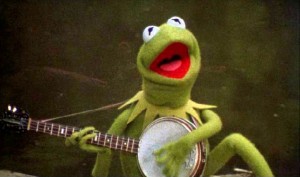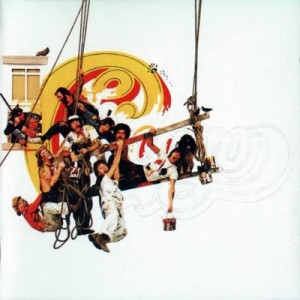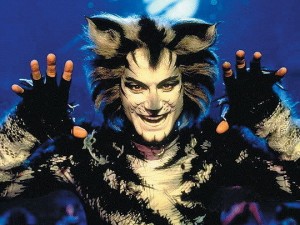I’m digging very much the groovy sounds made pre-1975 by this formerly fine band. And I think it’s a crying shame that their earlier reputation for making adventurous, jazz-influenced rock has been sullied and beaten and eventually run over by a fleet of fucking limousines by none other than the exact same band in the 1980s and onward.
So here is a quick and no doubt wildly inaccurate rundown of the band’s creative output and career, as I was able to glean it from reading Wikipedia. I will break it down album-by-album because I am such a nerd when it comes to music.
1969 – “The Chicago Transit Authority”
Probably one of the best debut albums I’ve ever heard and certainly the longest. Not many songs on this album that I would write off as shitty (“Free Form Guitar” only needs to be listened to once though) and a genuine, bona fide hit song in “Questions 67 and 68”. A lot of the material is a little too “poppy” for my tastes, but there are great extended numbers like “Introduction”, “Poem 58” and “South California Purples”. Very ambitious, and it comes together extremely well.
1970 – “Chicago” (AKA Chicago II)
Chicago Transit Authority was actually the full name of the band before the actual CTA threatened to sue them. So wisely, the band changed their name to simply “Chicago” and put out their second album titled the same. This one is a lot more “poppy” and radio-friendly than the debut album, though it contains the wonderful suite “Ballet For a Girl In Buchannon”. Even though this suite contains two of their biggest hits from this era, it’s still a great, progressive kind of track that I really like. There is an odd kind of classical-music-inspired suite called “Memories of Love”, but it comes off as a bit of a dud to my ears. “It Better End Soon” and “Poem for the People” are much more to my liking even though they’re a little too “political song” for “political song’s sake”. “Where Do We Go From Here” is much more sincere and effective at this, and the song is ended before the chord cycle finishes, which is in tune with the lyrical content. Brilliant. Give it a listen. Yes, this is me praising the work of Peter Cetera, whom I called The Devil in a post below.
1971 – “Chicago III”
The 3rd straight double album. Holy fuck, that’s a lot of music. A lot of filler, but a lot of amazing stuff too. Most bands couldn’t pull this off… they could get nowhere near this amount of original work done in such a short amount of time.
The album starts with something that is just awesome, a strutting jazzy, bluesy, rock ditty about old time pop stars from a bygone era. And did I mention it rocks? There are some more great moments on this album, like the “Travel Suite”, “An Hour in the Shower” and “Elegy”. And there are some flat out rockers that make great use of the horn section, like “Lowdown” and “I Don’t Want Your Money”. The latter features Kermit The Frog on vocals, I believe.

All in all, they toned down the poppiness and the political rhetoric a notch and just went all out firing on all cylinders when they recorded this. And that’s a little bit odd to consider what came out because they were exhausted from non-stop touring by this point. But what came out of the press is one of their best.
Oh, and the late Terry Kath, really, REALLY loved him some Spam.
1971 – Chicago at Carnegie Hall (AKA Chicago IV)
How long do you have? Seriously, how long do you REALLY have to listen to a live album? I believe that this is the very album that gave the term “Box Set” its name. It’s a double double album. The original release contained 4 vinyl records, and the 2005 remaster release contains all that plus an extra CD of bonus material thrown in. It took me 4 days to get through this one on the bus and train on my way to and from work. It’s 3 hours and 44 minutes long. And the horns weren’t miked properly. At lease not for a venue like Carnegie Hall, which wasn’t designed and build for amplified music. But there is a gem on here that you won’t find anywhere else. “Song for Richard and His Friends” is 7 minutes of damn fine proggy, jazzy funky even rocking and rollicking about “wishing President Nixon would quit”. But there isn’t much on this set that you won’t hear on Chicago I, II and III, so it’s really not worth getting unless you NEED the aforementioned song or just want it for some other reason.
1972 – Chicago V
A short album. Only 45 minutes, which was actually kind of long for a single album back then. But this one is all good start to finish. Even the overtly poppy stuff is nicely done, and not too grating on my nerves. The opener “A Hit By VarÁ¨se” is a little reminiscent of “Tarkus” by ELP, but that’s okay. This album has the band follow their jazz influences about as far as they would go. It wouldn’t be the last time they would record great and adventurous instrumental passages and pieces, but those days were sadly about to come to an end.
1973 – Chicago VI
Cue the first blatantly bad things I have to say about Chicago. The cover of this album is stylized to look like American paper money. The first song is called “Critic’s Choice”, and the opening line is “What do you want?”
Sadly, this is all quite literal. Robert Lamm was unhappy with what he had been reading about Chicago in the likes of Rolling Stone magazine, and that song was him asking the critics “What do we have to do to get in your good books?” Sigh. I’ve seen this album described as containing “shorter” and “more direct” songs, but to me, the adventurous spirit is just absent. You’ve got 7 extremely talented guys in the band who can make all kinds of amazing sounds… and you churn out stuff like “Just You ‘N’ Me”?
Okay, rock musicians have to eat too. And to be fair, this happened to damn near every band in the 70s. They sold out. Radio stations want to play hits and most people want to hear catchy songs about love. Most people don’t want to hear “A Hit By VarÁ¨se” and other odd-metered, weird-ass shit that I personally like. If I operated a radio station, no one would listen to it.
This album also marks the rise in prominence of Chicago’s “Soft Rock” sound. Hey, turn those amplifiers down! Quit hitting those drums so hard!
1974 – Chicago VII
The last hurrah for the jazzy side of things. The first half of this double album set (for all intents and purposes, their last double album set) contains a great jazz-rock fusion workout with very few standard rock or even lyrical moments. The first half is in fact very avant-garde and progressive. There is stunning playing from each member, and it’s easy to tell that they are genuinely into this music as they are playing it.
But it’s over way too soon. The second half is much like Chicago VI, and though it’s not very bad, it’s not very good either. Plus it contains a song I truly fucking hate – “Call on Me”. This is muzak. This is a fucking snoozer. This is crappy sappy bubblegum snappy pop. Unsurprisingly, it was a big hit.
And with that, the band laid their jazz, progressive and instrumental elements to rest.
1975 – Chicago VIII
Straight ahead rockers, surprisingly energetic considering the direction things would take in the following releases. Not bad, but nothing like what the band used to be able to do. Under 40 minutes too. Somebody’s tired…..
1975 – Chicago’s Greatest Hits (AKA Chicago IX)
I used to see this CD in record stores (remember those?) and think “What kind of band needs 8 members?” and “What instrument does the dog play?”

This is long out of print and contains pretty much only the songs I poo-pooed all over in the text above.
1976 – Chicago X
Ugh. The cover art looks like a chocolate bar being unwrapped to reveal the band logo. This album is the nutritional equivalent of a chocolate bar. Where you could still get a proper meal with the first 5 albums, and even a great snack on Chicago VI and VIII, this one won’t fill you up at all. The rock sounds contrived and the new danceable songs come off as a band trying a new style they don’t really understand. I’ll also criticize the production on this. Up til now, James William Guercio had produced the bands albums, and made them sound great. There’s not much I would criticize about the way he made the previous albums sound, but this one sounds flat. A new approach was needed for the change in style.
1977 – Chicago XI
Ugh II. I’m not sure if this one is just as bad or even worse than Chicago X. I’ve only listened to it once, and that might be all I give it. After this album, the band decided to ditch Mr. Guercio, as he had become a little too controlling in their affairs anyway. But the biggest change to hit them would be the death of Terry Kath.
Accidental Suicide. Seriously. Damn it, he was a great guitarist.
1978 – Hot Streets (AKA Chicago XII)
Disco. Fucking disco. Somebody get a mirror and a blade, cause I got the coke.
So after Mr. Kath put a bullet in his head by accident… oops… The band thought about quitting. But they didn’t. To their credit, they did become far more successful in the 80s than they had been in the 70s, but I’m getting ahead of myself.
New sound, and a new producer. And there are actually 3 very good songs on this. Might as well get them out of the way before I slash and burn the rest. “Alive again”, “Hot Streets” and “Ain’t it Time” are good. There. I said it. So even while these guys were looking like pathetic has-beens trying to cling to whatever fame they had, they were actually making some great stuff. A small amount, however.
And how bad is the rest of the album? Disco died for a reason, you know. And so did the career of one Donnie Dacus. He was the guitarist/vocalist they got to replace Terry Kath. Meh. He’s okay. He sure couldn’t hold a candle to Terry’s guitar playing.
There’s not much more to say about the bad songs on this album than they are embarrassing disco schlock. “Little Miss Lovin'” is particularly bad though. Not only does it feature the actual fucking Bee Gees on backing vocals, but it’s about a 30-ish year old man ogling a slutty 16-year old girl in very tight disco pants. Come on. This kind of shit made new-wave look respectable.
1979 – Chicago XIII
Disco II – Electric Boogaloo. I shouldn’t joke about that actually. This was pretty close to that era, and in another timeline, it might have been the title of the album.
Moving right along, this one is somehow worse than “Hot Streets”. There aren’t really any good songs on it, though “Must Have Been Crazy” by Dacus and “Reruns” aren’t bad. It’s saying something when one of the decent tracks on the album sounds nothing like Chicago.
And what of Mr. Dacus after he was… ahem… ejected from this band? He was last seen as part of the cast of “Cats”. Lol. I mean, quite heartily, LOL.
1980 – Chicago XIV
The last hurrah for doing things like an actual band, I guess. And it’s not actually that bad. I’ve only listened to it once so far, and I don’t think it deserves the reputation it’s gotten for being so terrible. It’s certainly better than Chicago XIII. No disco on here, and no Donnie Dacus. Some other guitarists are present, and for the most part, the band does the quick and poppy kind of love songs that they first tried out on Chicago VIII. But this one has a kind of New Wave feel because, well, it was 1980. The first track “Manipulation” stands out as being very energetic and fun to listen to, but the rest of it is… um… made out of cardboard. Yes, the sound of this album is made out of cardboard.
That’s where I’ll stop for now. Christ, this band put out way too many fucking albums. It’s a good thing I’m way too scatterbrained to actually write full, proper reviews of them. And I’m also really glad I can actually enjoy life, not like that stick in the mud Robert Christgau. Have you ever read his reviews? He calls himself (I’m not making this up) the “Dean of American Rock Critics”. Damn. That sounds serious. Has he seen a doctor about that?
Every time I’ve seen one of his record reviews, it’s a one or two sentence dismissal that looks like something he’d scrawl on a piece of paper just before slicing his wrists open.
Anyway, I’m a regular explosion of ball lightening when it comes to fun. I don’t know what that means, so please don’t ask me to explain.
I am a one-man Dukes of Hazzard.
